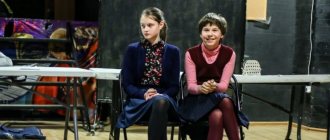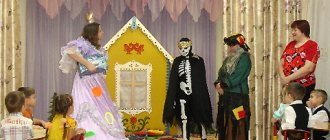Educational games for children 2-3 years old
First of all, we note role-playing games. This can be either classic mother-daughters or interaction with a doll that comes to children’s classes and gives them interesting tasks.
Games for both fine and gross motor skills are important. Sorting objects, climbing, throwing a ball, jumping over low obstacles, not just in the company of an adult, but also together with other kids, coordinating efforts, taking turns, showing patience and demonstrating mutual assistance, is very useful for two-year-old children. Two- and three-year-old children are able to cut out simple shapes (strips, pieces) with children's scissors, sculpt from plasticine, draw “scrawls” and name them thematically.
Educational games for children 4-5 years old
Role-playing games at this age expand in themes and plots. Kids are able to imagine themselves as drivers, salesmen, doctors and act in accordance with the role. Playing role-playing games with peers is much more interesting than with adults at home!
Motor skills games continue to develop the ability to climb, jump, walk backwards, move at different paces, cut, sculpt, design. At the age of 4-5, children are already able to master the rules, so outdoor games according to the rules with a driver, using game rhymes and songs, are added to the classes.
Didactic games continue to introduce 4-5 year old children to color and shape, teach them to master counting objects, perform simple mathematical operations of addition and subtraction one at a time, broaden their horizons and ideas about the world of animals, plants, professions and occupations of humans, and the structure of the Earth.
Games for speech development for 4-5 years old are aimed at improving speech and expanding vocabulary. Preschoolers of this age are able to master complex sentences, reason on given topics, retell stories they have heard and seen, compose a story based on a picture, and even compose simple rhymes.
In addition to educational games for preschoolers, children's centers are happy to engage in theatrical activities, handicrafts, English, and musical activities. As a rule, parents who bring their children to classes at clubs are not disappointed and continue to take their children there for years to come.
Consultation “How to make an activity interesting for a child?”
Victoria Usova
Consultation “How to make an activity interesting for a child?”
This question is asked both by the child’s parents, doing developmental tasks with him at home, and by specialists.
Why is it important?
Interest is an active cognitive focus on an object. An interested child will be happy to study a new subject, remember the necessary information, and actively use the acquired knowledge. Thus, interest stimulates the development of cognitive processes (attention, memory, thinking).
Interest is motivation. If a child is interested, he will complete any task, even complex ones.
Interest is directly related to positive emotions. Everything that brings joy to a child stimulates his development.
What can you do to make your child interested?
Present tasks in a playful way. For a preschooler, play is the leading activity that determines his development, but even for older children, the craving for play does not fade. Only the form changes: for kids you can use some kind of fairy-tale plot (or use its motifs, for example “The Adventures of Kolobok”, where completing each task allows the main character to escape from danger. For older children, board games, for example “adventure games”, become interesting: child rolls the dice, takes the required number of steps and receives the corresponding task, after completing which he can receive a certain number of points or a chance to continue the game.The most important thing is that the game makes sense (save Kolobok, score a certain number of points, receive a reward).
Offer new unusual tasks. For example, a child does not remember well. You ask him to memorize objects on the table, pictures, words... The child quickly gets bored with this. But you can memorize anything, anywhere: turn on excerpts from several songs and offer to repeat them, look carefully at the room, let the child go out, change something - will he notice? Encourage him to remember the shopping list when you go to the store. Believe me, there is a lot of information around that you can remember!
Use your favorite toys. Does your child love balls? Build your lesson around this interest: take a few balls, what size, shape, size are they? How many are there? Which one is missing? What's superfluous here? We’ll load the balls into the car and take them to the “clearing.” With a slight movement of the hand, the ball turns into a Kolobok or a turnip? Use your imagination and everything will work out!
Let your child feel the “taste of victory.” Even the most sophisticated toy can lose interest if suddenly something doesn’t work out. Help your child move towards success in small steps, believe in himself, and understand that he can do anything if he tries.
These simple tips will help you make your practice more effective.
Educational games for children
Oh, what a pity that there are no developmental games for adults! Many uncles and aunts would be happy to sing songs according to a schedule, tumble in the pool and draw suns and houses to hang on the common wall. Since publications appeared in the media with stories about the discoveries of psychologists and neurophysiologists in the field of child development, the idea of developing children through special efforts has been implemented in special institutions - children's centers and clubs. As a rule, classes in such institutions are called “developmental classes.” Their difference from a kindergarten lies in the optional presence of routine moments: sleep, lunch and dinner, etc.
Perform developmental exercises from Ikyusha
Mathematics
Reading
The world
Logics
English language
Didactic games for two-year-old children include familiarization with color, basic counting skills, familiarization with animals and plants, and geometric shapes.
Games for speech development for 2-3 year olds are aimed at expanding vocabulary and developing the grammatical structure of speech. Such games help to use words with the correct endings, formulate thoughts, answer questions, and remember synonyms.
Educational activities and games for children from 2 to 11 years old
Go to classes
Just think: the whole point of educational activities for children is to help parents organize fun and useful leisure time for their child. Yes, you can attract parents with various slogans and meanings: “after three it’s too late,” “we need to raise a harmonious child,” and others. But the truth of life is that no matter what we do with children, any activity develops them. Especially if there are elements of novelty in this activity. Teachers really know how to take care of this.
What is customary to do in children's centers and clubs? Educational games, in contrast to entertaining ones, help the child gain new experience, learn to solve new life problems, and teach them to build communication around a gaming problem situation. In children's centers and clubs, children engage in activities that they cannot do at home or on playgrounds, because there are not many parents with minimal pedagogical training. Let's get acquainted with the games that “developers” can offer you.







